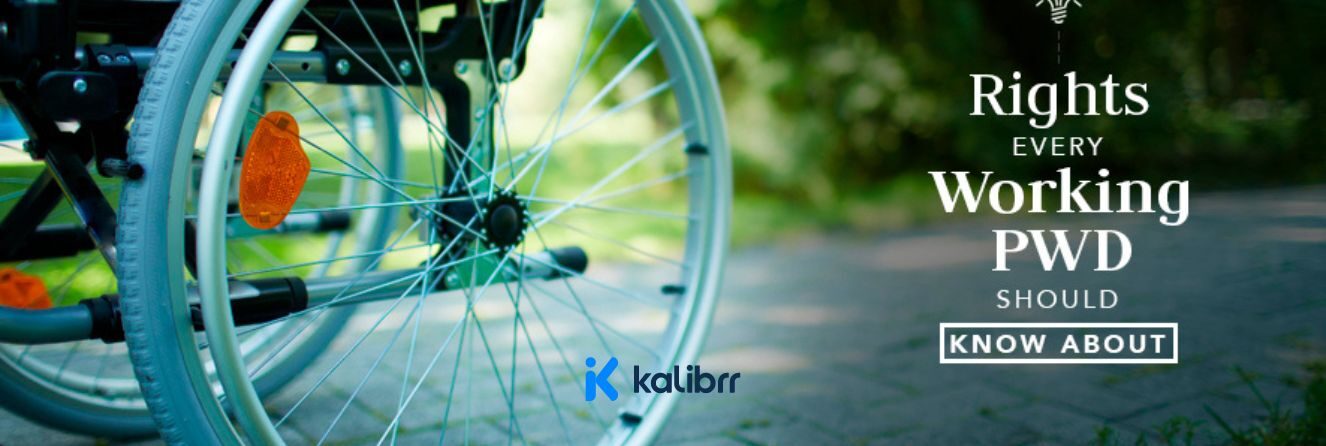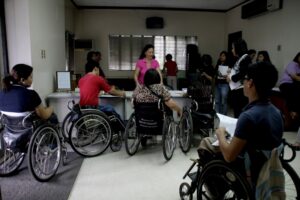Rights every working PWD should know about

Cliche as it may sound, everyone has been given talents, capabilities, and the natural ability to learn new skills for the sole purpose of using them — even persons with disabilities (PWDs). In the Philippines, there are many different companies who employ PWDs, giving them a chance to participate in society just as much as any other person.
In a 2013 study by the Philippine Institute for Development Studies, it was observed that “pessimism and lack of self-esteem” prevented PWDs from even trying to participate in “mainstream employment.” They either believed that there wasn’t any work for them out there or they were too “shy to go out and interact with other people.” The same study showed that only 57.1% of PWDs here in the country are employed, as opposed to the 93.4% national employment rate, with 58.3% of PWDs in urban areas and 41.9% of PWDs in rural areas all having work.
Owing to their disabilities, they have special rights in the workplace that help them perform their work to the best of their ability and to fulfill their maximum potential. These laws are meant to protect, assist, and encourage PWDs to find their own ways of participating in society.
All of these rights and privileges are detailed in Republic Act 7277, commonly known as the Magna Carta for Disabled Persons. For the benefit of PWDs and those who employ and work with them, Kalibrr lists down those sections and chapters relevant to finding work, the conditions appropriate for a PWD-friendly workplace, and adds some helpful notes too.
TOPICS
You have the right to be employed in the same way as able-bodied people are as long as you can perform the work.
Section 5 states that no disabled persons shall be denied access to opportunities for suitable employment. They are subject to the same terms and conditions of employment, compensation, privileges, benefits, and/or allowances like that of an able-bodied person. Five percent (5%) of casual, emergency and contractual positions shall be reserved for PWDs in government agencies, offices or corporations engaged in social development.
“No disabled persons shall be denied access to opportunities for suitable employment. A qualified disabled employee shall be subject to the same terms and conditions of employment and the same compensation, privileges, benefits, fringe benefits, incentives or allowances as a qualified able-bodied person.”
If you’re interested to work for the government, check out our government job posts on Kalibrr.
You have the right to be provided work that accommodates your disability.
In Section 6, it states that if suitable employment for disabled persons cannot be found through open employment as stated in the preceding section, the State shall work to provide it by means of sheltered employment. In the placement of disabled persons in sheltered employment, it shall accord due regard to the individual qualities, vocational goals, and inclinations to ensure a good working atmosphere and efficient production.
Sheltered employment is an arrangement where those who aren’t capable of working in a competitive setting are provided with work in work sites or centers exclusive to PWDs. The work usually involves vocational programs. As stated here, the State is responsible for providing such centers if some PWDs experience a lack of opportunities and suitable employment. The end goal is to enable them to work in integrated work spaces.

You have the right to be hired as an apprentice if you are able to perform the job.
From Section 7, as subject to the provision of the Labor Code, disabled persons shall be eligible as apprentices or learners, if their handicap will not so much hinder the performance of the job for which they are hired. If after the period of apprenticeship, their performance was found satisfactory, they shall be eligible for employment.
“Subject to the provision of the Labor Code as amended, disabled persons shall be eligible as apprentices or learners; Provided, That their handicap is not much as to effectively impede the performance of job operations in the particular occupation for which they are hired; Provided, further, That after the lapse of the period of apprenticeship if found satisfactory in the job performance, they shall be eligible for employment.”
You have the right to be trained in order to develop skills for employment.
Section 9 states that the State shall take appropriate vocational rehabilitation measures for disabled workers and workers in general to develop their skills, and enable them to compete for available productive and beneficial employment opportunities in the labor market, including disabled persons in the rural areas.
“The Department of Social Welfare and Development (DSWD) shall design and implement training programs that will provide disabled persons with vocational skills to enable them to engage in livelihood activities or obtain gainful employment. The Department of Labor and Employment shall likewise design and conduct training programs geared towards providing disabled persons with skills for livelihood.”
On their site, DSWD has a list of Rehabilitation Sheltered Workshops where they provide vocational training as well as social rehabilitation and skills training. They list down what kinds of trainings are available in each center, such as massage, handicraft, dressmaking, and canteen management.

You have the right to be trained for advancement in employment.
Section 10 states that the DSWD shall provide evaluating vocational guidance and counseling to disabled persons in order to secure, retain, and advance them in employment.
“[DSWD] shall ensure the availability and training counsellors and other suitability qualified staff responsible for the vocational guidance and counseling of disabled persons.”
Aside from these, PWDs also have the right to supporting aids and services in and out of the workplace, which are listed in Chapter 1, Section 5 of Republic Act 7277. Some relevant ones to those who are employed are the following:
- acquisition or modification of equipment or devices;
- other similar services and actions or all types of aids and services that facilitate the learning process of people with mental disability;
- Reasonable Accommodation include (1) improvement of existing facilities used by employees in order to render these readily accessible to and usable by disabled persons; and (2) modification of work schedules, reassignment to a vacant position, acquisition or modification of equipment or devices, appropriate adjustments or modifications of examinations, training materials or company policies, rules and regulations, the provisions of auxiliary aids and services, and other similar accommodations for disabled persons
In the same section, the Magna Carta states that PWDs shall be accepted or denied based on the “essential functions” of the post they’re going for, which should be specified in the employer’s job description:
Qualified Individual with a Disability shall mean an individual with a disability who, with or without reasonable accommodations, can perform the essential functions of the employment position that such individual holds or desires. However, consideration shall be given to the employer’s judgement as to what functions of a job are important, and if an employer has prepared a written description before advertising or interviewing applicants for the job, this description shall be considered evidence of the essential functions of the job;
Those who employ PWDs also have their own incentives, as cited in Section 8 below.
Benefits for the employer
Private entities that employ disabled persons who meet the required skills, either as a regular employee, apprentice or learner are granted adequate incentives. The entities, however, should provide proof certified by the Department of Labor and Employment (DOLE) that a disabled person is under their employ; and that the disabled employee should also be accredited with the DOLE and Department of Health on his disability, skills, and qualifications.
These private entities that improved or modify their physical facilities in order to provide reasonable accommodation for disabled persons shall also be entitled to an additional deduction from their net taxable income, equivalent to fifty percent (50%) of the direct costs of the improvements or modifications. This section, however, does not apply to improvements or modifications of facilities required under Batas Pambansa Bilang 344.
Seeing PWDs in the workplace shouldn’t be an exception – instead, it should be a norm. Read the whole Magna Carta for Disabled Persons to learn more about their rights and benefits. If there’s anything else about PWDs and career that you’d like to read about, let us know in the comments below.






No comment available yet!